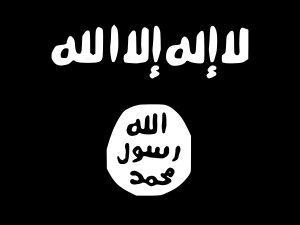Islamic State in the Greater Sahara
The Islamic State in the Greater Sahara (IS-GS) is a terrorist militant group with a Salafi Jihadism ideology. ISIS-GS was formed on 15 May 2015 as the result of a split within the militant group Al-Mourabitoun. The rift was a reaction to the adherence of one of its leaders, Adnane Abou Walid al-Sahraoui,[1] to the Islamic State of Iraq and the Levant.
| Islamic State in the Greater Sahara | |
|---|---|
 | |
| Active | 13 May 2015–present |
| Ideology | Salafi jihadism |
| Leaders | Adnane Abou Walid al-Sahraoui |
| Headquarters | Near Ménaka, Gao Region |
| Area of operations | Mali, Niger, Burkina Faso |
| Part of | Islamic State of Iraq and the Levant |
Al-Mourabitoun was created on 22 August 2013 after the merging of MUJAO and El-Mouaguiine Biddam.[2] On 13 May 2015, MUJAO pledged allegiance to the Islamic State in a statement by the group's leader, Walid al-Sarhaoui.[3][4][5] It operated independently until 30 October 2016, when it was formally recognised by the Islamic State.[6][7][8][9]
In December 2015, about 100 militants pledged allegiance to the Islamic State in the Greater Sahara.[10] The group's ranks increased by dozens of Mali militants and sympathizers from the Gao Region[11] near Ménaka.[12]
On November 28, 2019, Spanish authorities issued a warning on the possibility of a terror attack in the region against Spanish citizens visiting or working in the Saharawi refugee camps in Western Sahara.[13]
Spanish authorities feared the attacks would coincide with the Spanish Día de la Constitución (December 6) celebrations.[14] Secret services warned of the risk of a jihadist attack in the Sahara region at refugee camps in Tindouf, Algeria.[15] Sahrawi Arab Democratic Republic denied this threat.[16]
Organization, forces and location
Commanding officers
The group was founded and is headed by Adnane Abou Walid Al-Sahraoui. Al-Sahraoui may have been replaced towards the end of 2019 by a new emir, Abdoul Hakim Al-Sahraoui. Among his other commanders are Doundoun Chefou, Illiassou Djibo alias Petit Chafori (or Djafori) and Mohamed Ag Almouner, known as "Tinka", killed by the French army on August 26, 2018.
Forces
In early 2017, Marc Mémier, a researcher at the French Institute for International Relations (IFRI), estimated that the Islamic State in the Grand Sahara had a few dozen men - not counting sympathizers - mostly Malians in the region of Gao. At the end of 2015, RFI indicated that the group's workforce would total around one hundred.
According to a report from the Combating Terrorism Center (CTC) at West Point, the EIGS had 425 combatants in August 2018.
Settlement area and ethnic base
The group is based in the Ménaka region.
As with other armed groups in the Sahel, jihadists or not, the EIGS is part of a largely community-based dynamic. A large part of its combatants are thus Peuls. In Mali, the latter are for the most part Nigerien nationals whom the droughts and the demographic surge of Zarma and Hausa peasants, which is exerted from the south to the north, have pushed on the Malian side of the border. Adnane Abou Walid Al-Sahraoui has won the support of many members of this community by promising to protect them against raids and theft of cattle carried out by the Tuaregs, starting with the Dahoussahak.
However, the EIGS would include members from the two communities. Thus, at present, the combatants of the EIGS are divided into two katibas (combatant units), one composed mainly of Daoussahak and the other of Peuls.
See also
References
- "Rewards for ISIS-GS Leader Adnan Abu Walid". VOA. 10 October 2019. Retrieved 28 November 2019.
- AFP (22 August 2013). "Afrique : fusion de 2 groupes djihadistes". Le Figaro (in French). Retrieved 28 November 2019.
- "Le groupe El-Mourabitoune prête allégeance à l'Etat islamique". Alakhbar (in French). 13 May 2015. Retrieved 28 November 2019.
- "El-Mourabitoune appelle les autres groupes jihaidstes à prêter allégeance à l'Etat islamique (Audio)". Alakhbar (in French). 13 May 2015. Retrieved 28 November 2019.
- AFP (15 May 2015). "Sahel : un chef d'Al-Mourabitoune prête allégeance à l'organisation de l'État islamique". France 24 (in French). Retrieved 28 November 2019.
- Olivier, Mathieu (13 October 2016). "Dix ans après sa création, où en est l'État islamique en Afrique et au Maghreb ?". Jeune Afrique (in French). Retrieved 28 November 2019.
- "Bel Mokhtar dément l'allégeance du groupe El-Mourabitoune à l'Etat Islamique". Alakhbar (in French). 15 May 2015. Retrieved 28 November 2019.
- AFP (15 May 2015). "Mokhtar Belmokhtar récuse l'allégeance du groupe Al-Mourabitoune à l'EI". France 24 (in French). Retrieved 28 November 2019.
- "Mali: le groupe Etat islamique officialise sa présence au Sahel". Radio France Internationale (in French). 31 October 2016. Retrieved 28 November 2019.
- "Mali-Sahel: lutte de positionnement des groupes jihadistes". Radio France Internationale (in French). 6 December 2015. Retrieved 28 November 2019.
- Mémier, Marc (January 2017). "AQMI et Al-Mourabitoun : le djihad sahélien réunifié?" (PDF). Études de l’Ifri (in French). Institut français des relations internationales: 54. ISBN 978-2-36567-661-8. Retrieved 28 November 2019.
- "Niger: 15 militaires tués lors d'une attaque près de la frontière malienne". Radio France Internationale (in French). 23 February 2017. Retrieved 28 November 2019.
- [https://www.nytimes.com/aponline/2019/11/28/world/europe/ap-eu-spain-attack-alert.html Spain Warns of Possible Sahara Camp Terror Attack
- González, Miguel (28 November 2019). "Los servicios secretos alertan del riesgo de atentado yihadista contra españoles en el Sáhara". El País (in Spanish). Madrid: Prisa. Retrieved 28 November 2019.
- Araluce, Gonzalo (28 November 2019). "Informes secretos alertan del riesgo de "atentado inminente" contra españoles en el Sáhara". El Español (in Spanish). Retrieved 28 November 2019.
- "Exteriores alerta del riesgo de atentado contra españoles en el Sáhara". La Vanguardia (in Spanish). 28 November 2019. Retrieved 28 November 2019.
Further reading
- Warner, Jason (2017). "Sub-Saharan Africa's Three "New" Islamic State Affiliates" (PDF). CTC Sentinel. 10 (1): 28–32. Archived from the original (PDF) on 2017-04-30. Retrieved 2017-02-11.